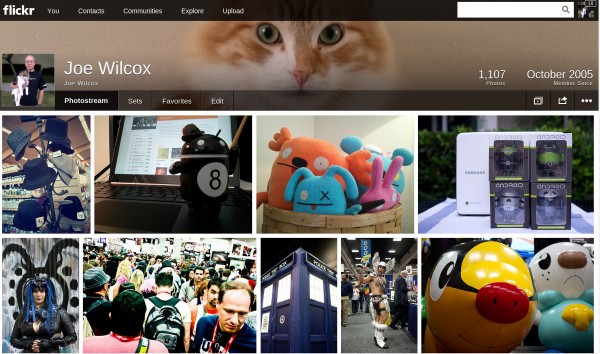
My oldest email address, circa 1996, is with Yahoo -- just three letters. I joined Flickr in October 2005 and Tumblr in May 2008. Three years ago, I stopped paying for Yahoo Mail, mostly abandoned the photo-sharing site and essentially stopped blogging at the social network. But I'm psyched now. Maybe former Googler Marissa Mayer can save the grandpa dot-com after all.
Today colleague Wayne Williams asks: "What will it take for people to care about Yahoo again?" "May 20th" is my answer. On the same day that Yahoo bought Tumblr for a cool $1.1 billion cash, the rickety dot-com gave Flickr the biggest makeover ever. Subscribers get 1TB of storage, on a site suddenly beautifully modern and supported by a hot, Android app. Google CEO Larry Page, Mayer just thumbed her nose at you.
Cloud before Many
No one should underestimate Yahoo, which was cloud before anyone used the term to describe the kind of services the dot-com delivers. Like Google, college buddies founded Yahoo -- in 1994. The company grew up with the World Wide Web. Mosaic Netscape, in beta, debuted the same year. The browser is gone, but the early web destination that David Filo and Jerry Yang founded remains.
Yahoo is a survivor, long lacking leadership worthy of it. Perhaps Mayer is better answer to Wayne's question. She assumed CEO responsibilities in mid July 2012. Days later, Wayne listed "8 things Marissa Mayer needs to do at Yahoo NOW". So far, she has done nearly all, fulfilling "launch, or better yet buy, a great new product" and "make Flickr awesome again", yesterday.
I care about Yahoo again, and you should, too.
- Yahoo is an iconic brand. The dot-com's services are tenacious, popping up in the strangest places. My AT&T U-verse uses Yahoo for email and serves up Flickr on the big screen.
- Yahoo is infrastructure -- vast server farms, and experience running them going back decades. Few cloud companies today can make such a claim.
- Yahoo is nostalgia. That's a brand quality both nurtured and innate -- the latter because of connotations associated with the name -- and one remembered; many oldsters took Internet baby steps on Yahoo (no one admits to starting on AOL).
What Yahoo isn't: A clear digital lifestyle alternative to Apple, Google, Microsoft, Samsung or Sony, among others. But Yahoo can be, as it once was, the glue for many other companies needing cloud services to offer customers. That means making more Yahoo co-branded services available everywhere. The company could easily be the service uniting many digital lifestyle brands, while spreading its own far and wide. There is newfound opportunity, too.
Google is increasingly a silo -- that's the real takeaway from last week's developer conference. Rather than release a new Android version, the search and information giant upgraded its apps and services. The approach tackles the fragmentation problem, by essentially upgrading Android's core without revving another version that won't reach the market for many months. But Google also steps back from so-called openness, by making more closed products (meaning not open source) the centerpiece of the Android experience.
Yahoo is the quintessential horizontal company, even if its services aren't necessarily open (by the purist definition). As Google goes vertical, space opens for a competitor to fill the gap. Yahoo has the chops and infrastructure, whether technical or logistical (including branding and marketing).
Old Dog Learns New Tricks
The massive Flickr makeover and Tumblr acquisition put fresh paint on the Yahoo brand. Big as they are, Mayer and her team face a daunting task. Yahoo needs a better mobile strategy and must cross-integrate more services, starting with the photo-sharing site and social network. The portal sucks and reminds everyone of the Yahoo we all grew to loathe. The same applies to Messenger. Every property must look as good as the new Flickr and offer as many benefits.
Most importantly, Mayer must recover search from Microsoft. Four years ago, I called Yahoo's search deal with Microsoft a gift to Google and accused the dot-com of giving up its crown jewels. Yahoo must take them back and reinvigorate the business model Google perfected, but did not pioneer. Yahoo was a search leader long before there was a Google and in 2003 acquired Overture, which pioneered the keyword search business that Page and Company imitated.
But search separation must be surgical, done over time. Fracturing Bing and Yahoo could create more opportunities for Google, and during the transition lead to even greater market share gains. Perhaps a new partnership is workable, where Yahoo regains its crown jewels but works with Microsoft on co-branded search.
Mayer clicks the right boxes, particularly the acquisitions that fill in gaps Yahoo desperately needs to fill. The stake in Dailymotion made sense (too bad about those French regulators). But there are nearly a dozen other acquisitions, since she assumed her duties. Be sure that she's only just started shopping.
Somebody likes what Mayer is doing. Since August 31 through mid-day trading today, Yahoo shares are up 85 percent. Flickr and Tumblr are reasons to get really excited. Something to think about: Flickr is as much social network as photo-sharing site. Long before Facebook opened to the public or Google waved the Plus flag, there was Flickr -- one of the oldest, thriving social networks. Tumblr makes Yahoo social all the better.
Yesterday, I uploaded a bunch of photos to my Flickr, about which I am really excited after long hiatus. My Tumblr will get a fresh makeover and postings sometime this week. Suddenly, I care about Yahoo again. You should, too.
Hey, Marissa. Make us proud and buy Vimeo. You need a web browser, too. But mostly you need to stay the course started.

